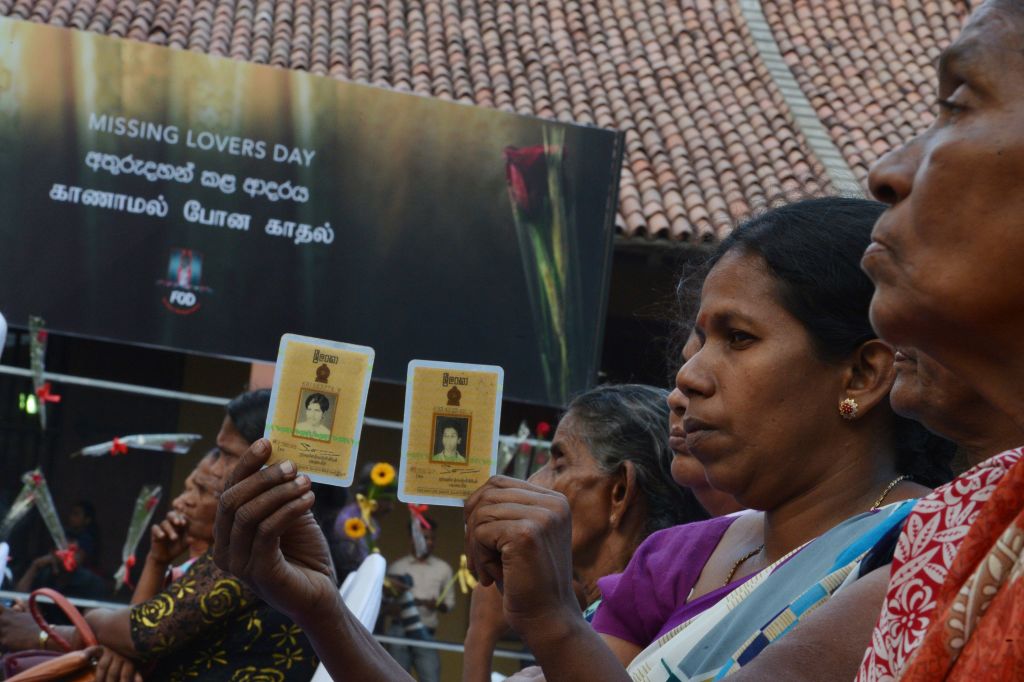- In Sri Lanka, many families of the forcibly disappeared mark 14 February as ‘Missing Lovers Day’ in remembrance of their loved ones and to demand truth and justice
The Sri Lankan government must deliver justice, truth and reparation to the families of the forcibly disappeared, Amnesty International said today, as the global human rights organization expressed solidarity with the families of the disappeared marching on 14 February in Colombo.
“The commemoration is a poignant reminder of the painfully long wait of families of forcibly disappeared for answers about their loved ones. Their families were taken away from their loved ones, and then they have been denied the truth about their whereabouts,” said Biraj Patnaik, South Asia Director at Amnesty International.
While many people around the world celebrate the day as ‘Valentine’s Day’, families of the disappeared in Sri Lanka mark the day in memory of their family members and seek answers about their love ones. Hundreds of family members of enforced disappeared persons from several parts of Sri Lanka are gathering in Colombo on Friday to commemorate their missing family members, and demand justice, truth and reparation by marching towards the offices of Prime Minister Mahinda Rajapaksa and the President Gotabaya Rajapaksa.
Sri Lanka has one of the world’s highest number of enforced disappearances, with a backlog of between 60,000 and 100,000 disappearances since the late 1980s. The authorities have also failed to protect witnesses and families seeking truth and justice, and failed to prosecute those suspected of criminal responsibility.
“The government must proactively support truth-seeking efforts by the families of the disappeared to get answers. To start with, the authorities should immediately provide information to the families of the disappeared, with detailed lists and information of persons who surrendered to the armed forces in the final phase of the armed conflict. The authorities should also independently investigate all those suspected of criminal responsibility for the enforced disappearance, and bring them into justice in fair trials before ordinary civilian courts,” said Biraj Patnaik.
Sri Lanka has made limited progress on the issue of enforced disappearances with the criminalization of enforced disappearances in March 2018—thereby giving partial effect to its obligations under the International Convention for the Protection of all Persons from Enforced Disappearance—and operationalizing the Office on Missing Persons. While some cases related to enforced disappearances are under investigation, the government, on many occasions, has appointed or promoted those suspected of crimes under international law into positions of power – signaling their indifference towards the calls of conflict victims.
Background
In June 2016, Chandrika Bandaranaike Kumaratunga, a former president of Sri Lanka and head of the government’s Office on National Unity and Reconciliation, acknowledged having received at least 65,000 complaints of disappearances since 1995. Sinhalese young people suspected of affiliation with the leftist Janatha Vimukthi Peramuna (JVP) were killed or forcibly disappeared by government-operated death squads in 1989 and 1990. Tamils suspected of links to the Liberation Tigers of Tamil Eelam (LTTE) were forcibly disappeared by police, military and paramilitary operatives during the armed conflict between 1983 and 2009, a pattern that continued for several years after the conflict ended. The LTTE took prisoners and abducted adults and children to serve as fighters; many of them are still missing today. More than 100 cadres of LTTE who surrendered to the Sri Lankan army near the end of war in May 2009, have also subsequently disappeared.
Families of people forcibly disappeared have persisted in their demands for information about their missing relatives for years. In 2019, the Office on the Missing Persons continued to oversee the carbon dating process for remains excavated from the site of a second mass grave in Mannar, in the Northern Province, and established regional offices in Matara, Mannar, and Jaffna, and issued a report which made recommendations for interim relief and justice.
In January 2020, President Gotabaya Rajapaksa, who was elected to office in November 2019, stated that “missing persons are actually dead”, without providing any basis for this broad-brush conclusion and which was condemned by victim groups, and families of the disappeared. The Sri Lankan government has an obligation to provide truth regarding the enforced disappearance, as outlined in the International Convention on Disappearances, which states that every victim – the disappeared person or any individual who has suffered harm as the direct result of an enforced disappearance, has the right to know the truth regarding the circumstances of the enforced disappearance, the progress and results of the investigation and the fate of the disappeared person.

Sri Lankan Tamil women gather to remember their loved ones missing for nearly a decade since the end of the countrys drawn out separatist war in the capital Colombo on February 14, 2018.>br /%lt; The women were marking what they called the missing lovers day to coincide with the Valentines Day to draw the spot light on thousands of people still listed as missing in the island despite the end of the war. / AFP PHOTO / ISHARA S. KODIKARA (Photo credit should read ISHARA S. KODIKARA/AFP via Getty Images)


